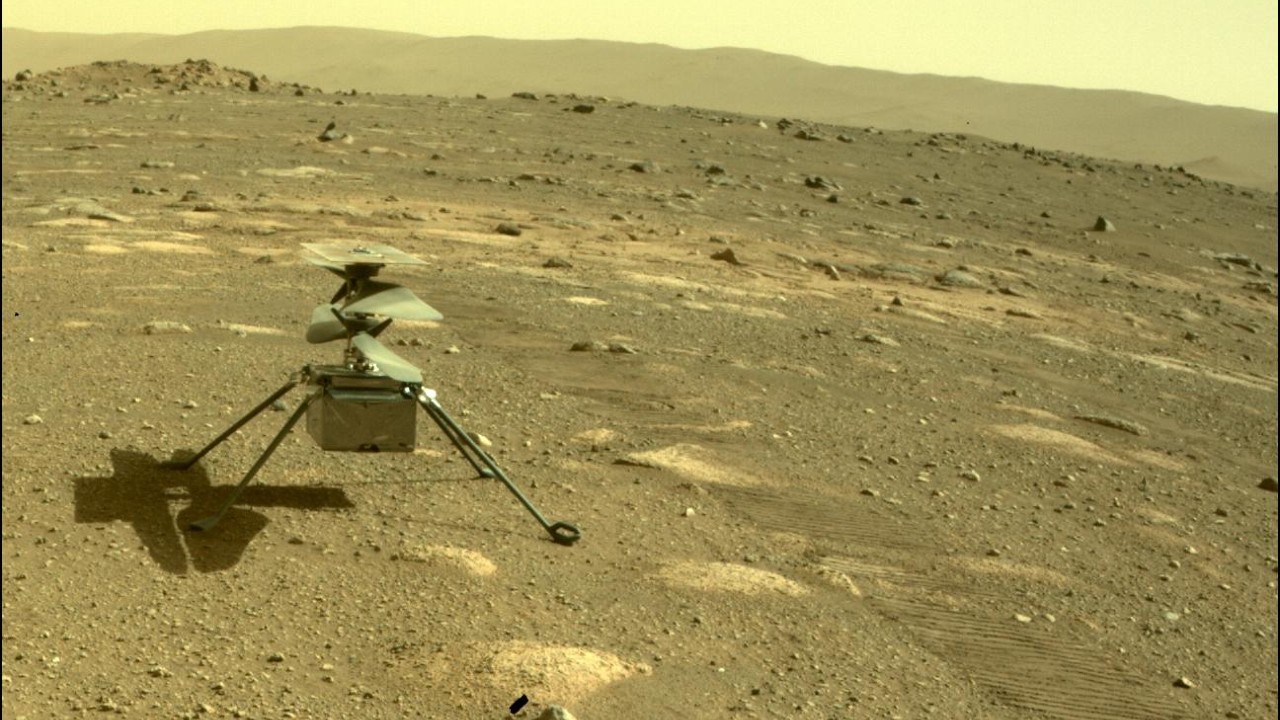NASA to 'wiggle' broken Ingenuity Mars helicopter's blades to analyze damage
"We couldn't be prouder or happier with how our little baby has done."

Breaking space news, the latest updates on rocket launches, skywatching events and more!
You are now subscribed
Your newsletter sign-up was successful
Want to add more newsletters?

Delivered daily
Daily Newsletter
Breaking space news, the latest updates on rocket launches, skywatching events and more!

Once a month
Watch This Space
Sign up to our monthly entertainment newsletter to keep up with all our coverage of the latest sci-fi and space movies, tv shows, games and books.

Once a week
Night Sky This Week
Discover this week's must-see night sky events, moon phases, and stunning astrophotos. Sign up for our skywatching newsletter and explore the universe with us!

Twice a month
Strange New Words
Space.com's Sci-Fi Reader's Club. Read a sci-fi short story every month and join a virtual community of fellow science fiction fans!
Ingenuity's mission is officially coming to an end, but not before mission scientists try to determine how much damage the helicopter suffered.
NASA held a livestream Wednesday (Jan. 31) to pay tribute to Mars helicopter Ingenuity, which suffered rotor damage on its most recent flight. During the livestream, mission managers revealed that all four of Ingenuity's blades were damaged during a rough landing on the Red Planet surface.
Teddy Tzanetos, Ingenuity Project Manager, said that NASA and JPL still aren't sure what caused the damage to Ingenuity's blades; it remains unclear whether the helicopter's power dipped during landing, causing unwanted ground contact, or if it accidentally struck the ground to cause a "brownout."
Tzanetos added that NASA and the Jet Propulsion Laboratory (JPL) will slowly rotate the helicopter's blades and "wiggle" them, or adjust their angle, while collecting video in order to allow the team to determine the extent of Ingenuity's damage. However, Tzanetos said that no matter what such imaging will show, the dual-rotor drone has flown its last flight and will soon end its mission.
"Helicopters like this are not designed to fly even with the smallest fraction of a grant of imbalance and we're gonna have the end of our mission in the weeks ahead," Tzanetos said during the livestream.
During the NASA Science Live webcast, Tzanetos and Tiffany Morgan, NASA's Mars Exploration Program Deputy Director, sang the praises of the plucky 'copter. Morgan described how Ingenuity proved to be a valuable companion for the Perseverance rover, with whom it has been exploring Mars since the pair landed on Feb. 18, 2021.
Breaking space news, the latest updates on rocket launches, skywatching events and more!
The helicopter was initially designed to make just five flights — its mission ended after number 72.
"Not only did it help us with designing for future missions, but it also helped with Perseverance's current mission. It scouted ahead and took a sneak peek at the operations Perseverance is going to experience, and that allowed the planners to navigate the terrain as well as to identify potentially compelling science targets," Morgan said.
The fact that Ingenuity was able to fly in the thin Martian atmosphere and carry out as many sorties as it did is a true testament to JPL's expertise and could foreshadow future missions, she added.
"The NASA JPL team didn't just demonstrate the technology, they demonstrated an approach that if we use in the future will really help us to explore other planets and be as awe-inspiring, as amazing, as Ingenuity has been," Morgan said.
The helicopter far exceeded the agency's expectations, especially given the fact that it was built with off-the-shelf commercial cell phone components and represented a largely unknown premise: Flying an aircraft on another planet.
"We couldn't be prouder or happier with how our little baby has done," Tzanetos said. "It's been the mission of a lifetime for all of us. And I wanted to say thank you to all of the people here that gave their weekends, their late nights. All the engineers, the aerodynamic scientists, the technicians who hand-crafted this aircraft."
Morgan added that NASA is already envisioning using future helicopters on other planets or celestial bodies that will be built on the foundation that Ingenuity has laid and the knowledge the agency has gained from this completed mission.
"I really look forward to the future and what we can do with with the offspring of Ingenuity," she said.

Brett is curious about emerging aerospace technologies, alternative launch concepts, military space developments and uncrewed aircraft systems. Brett's work has appeared on Scientific American, The War Zone, Popular Science, the History Channel, Science Discovery and more. Brett has degrees from Clemson University and the University of North Carolina at Charlotte. In his free time, Brett enjoys skywatching throughout the dark skies of the Appalachian mountains.
